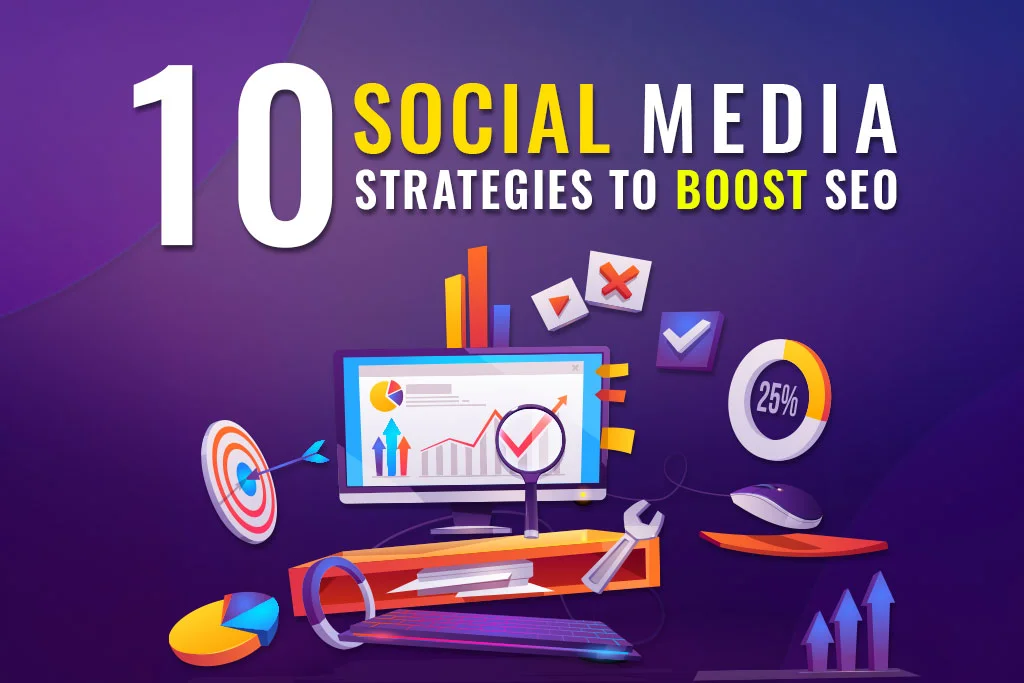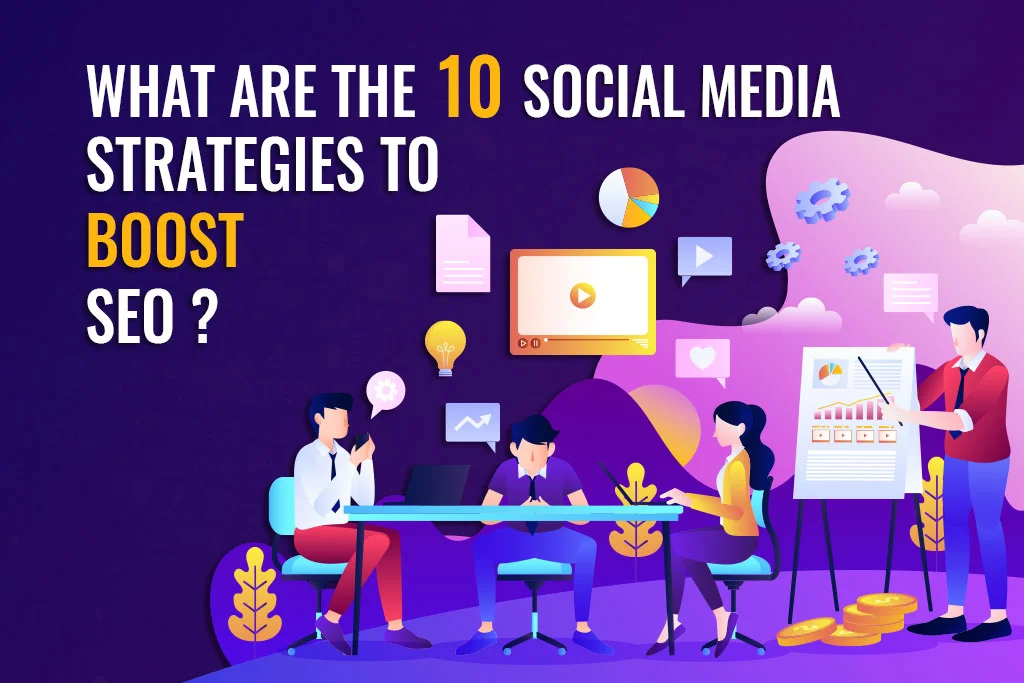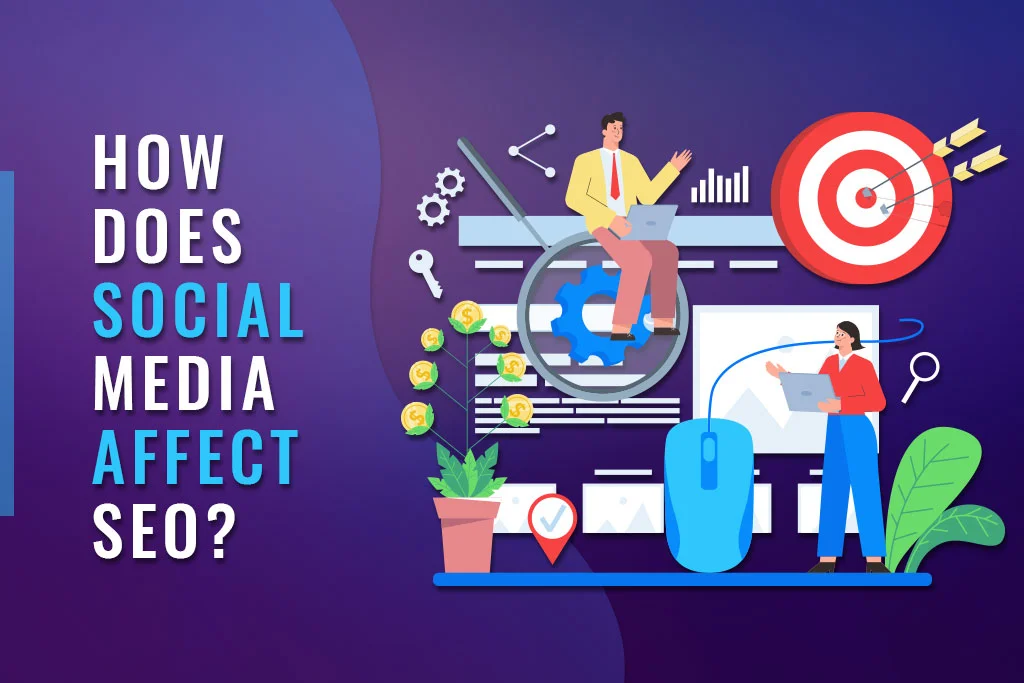Social Media SEO: 10 Social Media Strategies to Boost SEO

Do you want to know how social media strategies help boost SEO? Social media has a dynamic role in SEO. It not only improves the effectiveness of your SEO efforts but also increases their financial viability. Social media and SEO may appear to be in nature, but they complement one another. The use of social networks does not quickly contribute to SEO.
Using social media can improve your website’s SEO performance. It also increases its Google search rank. When it comes to growing your business, many companies today recognize that search engine optimization is essential. However, too many people continue to underestimate social media’s enormous potential, particularly in the B2B market.
If you look at the websites that rank highly in Google searches, you’ll see that many of them have strong social signals. So, if you invest in a strong social media marketing strategy, you will increase your chances of ranking well in search engines. In this blog, we are going to guide you through social media strategies to boost SEO.
What Is Social Media SEO?
Social media SEO allows you to optimize your social profiles so you can better attract potential customers through search. SEO best practices will vary across platforms. But the goal remains the same. While social media management and SEO optimization have two very different strategies. They can complement each other. Using both can help you gain traffic from a variety of different sources. Social media lets people discover new content or brands they might be interested in. SEO allows you to gain traffic from people searching for questions or phrases related to your business. Both search engines and social platforms aid in information discovery. People use Google to find an answer to a question. People use social media to discover answers to questions, they haven’t yet thought of. For example, Instagram search is one of the app’s core features.
What Are The 10 Social Media Strategies To Boost SEO?

Every step you take to increase your social media marketing should be related to your SEO strategy. If you want to be successful with social media SEO, use these suggested practices.
1. Optimize Your Social Profiles:
Optimizing your social media profiles is important for boosting social media SEO results. It ensures that profiles are filled with relevant information. It includes the website name, URL, and keywords in descriptions and updates. When viewers engage with your content, it enhances brand awareness and boosts SEO efforts. For example, Media Eclips, Texas, effectively used social media SEO. It includes key details about its blog post in a Facebook update. It also maximizes visibility and engagement.
2. Publish High-Quality Content:
Search engine optimization has developed. It becomes more approachable and mature. If you want to make sure that your social media content ranks for relevant keywords. Then, you need to create fresh and original content that provides value to your audience. Try to avoid keyword stuffing and focus on producing content that naturally attracts links and meets users’ needs. If you understand your target audience, then this is the key to publishing high-quality content that resonates with them and offers value. Your content is determined by its value and relevancy. It is the best thing for your potential consumers or prospects.
3. Integrated Keyword Strategy:
In today’s digital world, the boundary between search engines and social media platforms is increasingly blurred. Especially in terms of keyword strategy, it is essential to adapt the keyword strategy used for websites to social media engagement when needed. This does not mean keyword stuffing, but it means being aware of language in social media posts. If you add relevant keywords to social media content, it can enhance message visibility and reach. It aligns with broader digital marketing goals and improves overall visibility.
4. Optimize Your Images for Both, SEO and Social:
Images are important for both conveying messages and optimizing search engine results. If you ignore images in favor of text, then it is a mistake. Well-optimized images can significantly boost organic traffic. Start by using keywords in file names. Also, add appropriate alt text and surrounding text. Make sure that the images are inspiring and in the right format. Then, you need to share these images across all relevant social media platforms for optimal social sharing and engagement. These simple optimizations can have a significant impact on long-term success.
5. Build Trust in Your Business:

If you have a lot of brand awareness, trust in your business is essential to growth. The more expensive your offer, the more likely it is that your customers will conduct thorough research before making contact. It includes looking at what kind of business you have:
- 1. Social proof is most important. Because, mostly people want to see reviews, testimonials, statistics, awards, and more before they give you their money. That’s why social media is a great way to both collect and share social proof.
- 2. When you show your content, make sure it is a great way to showcase your expertise. While being helpful, unless you have a highly successful website. You can share your content on social media and get it seen more quickly than by hoping for organic search traffic.
- 3. When you start to make customers feel more comfortable with your company through social proof and content shared on social media. Then, you are more likely to be top of mind when they need your product or service.
- 4. As we told you before, 54% of social media users research products and brands on social platforms.
- 5. The kind of research people do into your business isn’t limited to what you sell or whether it works. They are examining every corner and crack.
6. Add Links to Social Profiles:
In social media messages like tweets and Facebook updates, links are usually no-follow. It means that they don’t pass SEO authority to the linked site. However, URLs in social media bios are links. They offer an opportunity to boost site visibility. To fully utilize it, make sure your social media bios contain relevant URLs, that direct users to your site. If you use the links below, you can help attract your audience to your website. It increases traffic and potential profits.
7. Establish Authority:
Social media, content marketing, and SEO are working together. They help consistently post high-quality content, establish expertise, and build audience confidence. It positively impacts search ranking success. When you use social media, it increases reliable content’s reach, brand awareness, and visibility across many digital channels. Businesses can use this combined strategy to improve their online presence and engage audiences across several media.
The social circle of the world recommends that these are the best times to post on social media:
Facebook:
The best times to post are Tuesday, Wednesday, and Friday between 9 am and 1 pm. The worst day of the week to post on Facebook is Saturday.
Instagram:
The best days to post are Tuesday between 11 am and 2 pm. And, Monday through Friday, at 11 am. Sunday is the worst day to post on Instagram.
Twitter:
The best time to tweet is Wednesday between 9 am and 3 pm, and Tuesday through Thursday between 9 am and 11 am. The worst day of the week to post on Twitter is Saturday.
8. Partnership With Social Media Influencers:
Social media influencers can multiply the visibility of your social media content. When your increased engagement, does not directly improve your search engine ranking. You will open the door to more links in the future by using this social media SEO strategy. For example, if an influencer has a 5 times bigger following. Then, if your social media efforts result in someone sharing your content, it will increase your visibility when the influencer’s following begins to Google you. As a result, your published pieces will have better value after sharing. Therefore, start connecting with relevant influencers to build a cycle in which they promote your content and talk about your brand.
9. Optimize Your Social Media For Improved Google SERP Visibility:
Optimizing social media profiles for SEO boosts visibility on search engines and drives organic website traffic. A strong profile base, audience-aligned content, strategic keyword integration, user-friendly links, and consistent engagement are key to success. While social signals are not direct ranking factors. Well-optimized social content can improve access to Google SERPs. It is especially for branded demands. For example, videos shared on platforms like YouTube, TikTok, and Facebook often rank highly on SERPs. It outranks similar on-site articles. Flexibility and ongoing changes in your approach are important for achieving successful outcomes.
10. Analyze and Optimize:
You should regularly monitor your social media analytics to gain insights into what content performs well and connects with your audience. Use this data to refine your social media strategy and optimize your future posts. SEO for social media is an ongoing process. It requires consistency and adaptability. Stay up to date with the latest trends and algorithm changes across social media platforms and search engines, Just make sure that you’re employing the most effective strategies. By implementing these SEO techniques, you can enhance your social media presence and drive organic traffic to your content. It ultimately increases your online visibility and engagement.
How Does Social Media Affect SEO?

Social media has no direct impact on how SERPs rank content. Link sharing on social media platforms increases brand exposure and influences SEO. Social media can indirectly increase search visibility and organic rankings through social metrics and signals. Guidelines like shares, likes, and comments help build trust, customer loyalty, and brand awareness. These strategies indirectly raise online visibility and traffic. The search engines look to evaluate a brand’s online reputation and influence SERP rankings. An effective search requires a marriage between content and context. Sites with an SEO plan and consistent traffic from social media platforms and other sources are viewed as credible by search engines.
Social media can influence SEO in different ways, which are given below:
- 1. It enhances the brand’s reputation.
- 2. Increases brand awareness.
- 3. It distributes content extensively and without cost.
- 4. Also, it increases local SEO.
- 5. It boosts the life of evergreen posts.
- 6. Also, it improves online visibility.
Conclusion:
Social media helps people discover new brands. While SEO helps a brand generate more traffic from its target audience. Marketing teams that use both, then they can help their organizations increase traffic, awareness, and authority from a variety of sources. While traditional SEO strategies remain the most common approach for gaining search engine visibility. It appears that social media SEO is important for establishing authority.
Therefore, put some effort into optimizing your social media profiles, connecting with the right influencers, and posting quality updates on each social media network. You’ll be stunned at the long-term return on investment from these projects. For your digital marketing services, you can rely on us. MediaEclips is a premier digital marketing agency in Plano, TX. If you want to ask a question or want a guideline, you can request a consultation call with our experts.
FAQs:
Social media indirectly impacts SEO. It increases brand visibility, drives website traffic, and generates backlinks. All factors can positively influence search engine rankings.
SEO is not directly required for social media. It optimizes social media profiles and posts with relevant keywords. It can improve visibility and reach on search engines.
Both SEO and social media are important for different reasons. SEO boosts website visibility on search engines, while social media enhances brand awareness, engagement, and community building. Its importance depends on your specific goals and target audience.

